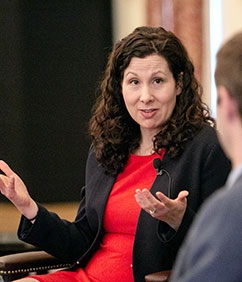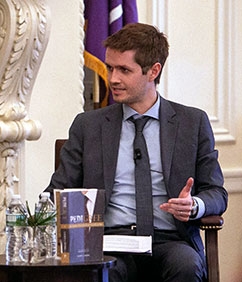Lauren Rivera questions meritocratic assumptions in Big Law hiring
How big a role do merit and hard work play for applicants hoping to get in the door at elite law firms, banks, and consulting firms? Northwestern University Professor Lauren Rivera’s research suggests that many such high-powered jobs go disproportionately to upper-class candidates from prestigious colleges and universities. At a March 5 event hosted by NYU Law’s Center for Diversity, Inclusion, and Belonging (CDIB), Rivera discussed how current hiring criteria privileges the affluent, arguing that increased standardization in hiring interviews could create a better meritocracy.
In a conversation with CDIB executive director David Glasgow LLM ’14, Rivera discussed her 2015 book, Pedigree: How Elite Students Get Elite Jobs, and the nine months she spent in researching it: observing recruitment events and hiring meetings and interviewing human resource professionals and employees at banks and big law and consulting firms.
Rivera noted that the most important factors in hiring and résumé screening were school prestige, grades, extracurricular activities, and the selectivity of prior employers. By far the most important hiring factor, Rivera said, was school prestige. But that criterion can be misleading, she said.
“We have this notion in the US…that we think school prestige signals intelligence,” Rivera said. “But what we know is that it’s not that students at the most elite schools are the smartest, by any means. When it comes to superlatives, what we know is students at the most elite law schools, most elite undergraduates, are the wealthiest.” Parental income is also the strongest predictor of whether a student participates in structured extracurriculars, including varsity sports, she noted.
If candidates make it through an employer’s initial screening, Rivera said, they face additional class-based expectations: In interviews, they are sized up for “polish” and workplace fit. “[Polish] has a very classed component and a very…racialized component too, about what constitutes professional communication,” she said.
The interviewers whom Rivera studied placed enormous weight on their perception of how well a candidate would fit into the firm’s existing culture. In practice, this judgment reflects to what extent an interviewer and interviewee were able to find common social or cultural ground, she said. This “similar-to-me bias” rewards elite students from upper-class backgrounds.
Rivera and her colleagues also examined how socioeconomic class intersected with membership in other groups, like gender. They found that even when upper class male and female applicants had similar credentials, men were four times more likely to be called for an in-person interview.
“Women don’t reap the advantages of being a good fit because upper class women are perceived to be ‘future soccer moms in the making,’” she said. “We call it a ‘pre-motherhood penalty.’”
Rivera’s research also found that underrepresented minorities from upper or middle class families suffer in an interview setting, because there is an expectation that they will have a specific narrative of having overcome obstacles.
“One of the ways into the firm for people from underrepresented minorities was to present the bootstrap narrative…and when you’ve got middle class minority candidates, who were not telling these narratives, because that was indeed not their story, they were penalized,” Rivera said.
Glasgow asked her how firms might reform these biased interview practices. Rivera said that first a firm must show a desire to change the recruiting process, and then should utilize job-related simulations to better gauge an applicant’s skillset. Rivera also called for an end to unstructured interviews.
“My problem with unstructured interviews is not only that it’s a free-for-all in terms of class bias, race bias, gender bias, but they’re actually really, really bad at predicting how good someone is on the job.”
Watch the full video of their discussion:
Posted March 26, 2019



